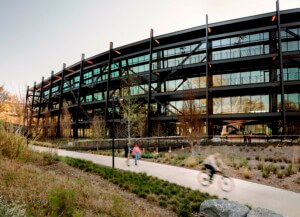Meet the incubators and accelerators producing the new guard of design and architecture start-ups. This is part of a series profiling incubators and accelerators from our April 2018 Technology issue.
Founded by Professor Chuck Eastman, a renowned trailblazer in building computer sciences and one of the creators of BIM, Georgia Institute of Technology‘s Digital Building Laboratory (DBL) in Atlanta quickly earned a sterling reputation after its founding in 2009. Now led by Associate Professor Dennis Shelden, an architect and digital technology expert who previously was the director of research and development and computing for Frank Gehry, the lab aims to harness its educational position as an indispensable source for knowledge capital.

“We have a strong connection to the professional practice,” said Shelden. “Our ability to connect between technology and projects as an academic institution is one of our most valuable assets. We are very much focused on solving concrete problems through our research and our role as an academic and open research institution.” The DBL particularly focuses on “helping students disrupt the industry in order to collectively advance it.” This includes pushing open-source initiatives and embarking on ventures that might be too risky for a company to take on, with the awareness that free innovation now could yield big returns later.
In addition to supporting Georgia Tech’s School of Architecture, the DBL creates programs around entrepreneurship along with developing new and advancing technology. “What is happening now is that reduced friction across the building industry creates new opportunities and risks,” said Shelden. “Architects have an expanded reach into other domains and can tackle environmental engineering and other tasks that used to require retaining an outside consultant. But on the other side, that means developers and contractors can do in-house architectural and consulting work. So, we see a convergence in the industry, and there are great opportunities but also a lot of new competition that didn’t exist before.”
The incubator champions AECO technology-related entrepreneurship while focusing on four technical areas representing the most disruptive potential for the AECO industries: data standards and interoperability, integrated project systems, design and construction automation, and smart buildings and cities.

The laboratory currently hosts several departments: the living laboratory campus, a testing ground for “digitally integrated design, construction, and operations projects;” the technology test bed, a place for testing data exchange and interoperability scenarios; and a Digital Fabrication Lab, a 13,000-square-foot space for prototyping and research; as well as research and entrepreneurship programs. Contributing members to the DBL are Autodesk, Oldcastle, and Vectorworks, and associate members include Perkins+Will, the Smithsonian Institute, Thornton Tomasetti, Skanska, and SmartBIM Technologies.
Notable alumni include:
Kereshmeh Afsari
Defended thesis in November 2016 and is now an assistant professor in the School of Construction Management Technology and the Department of Computer Graphics Technology at Purdue University.
Marcelo Bernal
Graduated spring 2016 and is now an assistant professor in the department of architecture, Universidad Técnica Federico Santa María.
Yongcheol Lee
Defended thesis in November 2015 and is now an assistant professor at Louisiana State University, Baton Rouge, in the department of construction management.
Hugo Sheward
Defended thesis in fall 2015 and is now an assistant professor at the School of Architecture, University of Kansas.
Shiva Aram
Defended thesis in December 2015 and is now the strategy lead and senior product line manager at Cisco.











